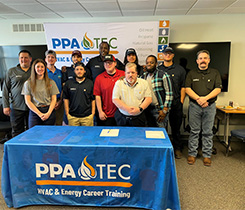NPGA moves to stymie congressional threat to PERC authorization law
An ill-timed effort to create a checkoff program for the Christmas tree industry has produced a legislative backlash that threatens the operation of the Propane Education & Research Council (PERC).
On Nov. 8, a program of the U.S. Department of Agriculture (USDA) establishing a “national research and promotion program for Christmas trees” to strengthen and expand markets for fresh-cut U.S. Christmas trees was published in the Federal Register. The effort provided for an assessment of 15 cents per tree – similar to self-assessments that other industries use to fund their checkoff programs.
The program was several years in the making by the Christmas tree industry after concern about lost market share to the artificial Christmas tree industry. An industry task force proposed that the USDA create the program by regulation to be followed by a referendum among domestic tree producers and importers three years after the first assessments to determine whether they favor its continuation.
Despite widespread usage of the phrase “Christmas tree tax” in a flurry of media reports about the program, the assessment was not intended to be a tax to raise revenue for the government. But unfavorable public reaction forced the White House to announce Nov. 9 that implementation of the program was indefinitely delayed.
Among the many critics was Sen. Jim DeMint, R-S.C., who lambasted the checkoff program in his blog. Calling it “crony capitalism” and “the stupidest tax of all time,” DeMint promised to offer an amendment for its repeal.
On Nov. 16, DeMint submitted two amendments he plans to propose to de-authorize all checkoff programs. One would repeal the Propane Education & Research Act (PERA); the other would prohibit the use of funds to pay the salaries and expenses of Department of Energy (DOE) staff that oversee PERC.
National Propane Gas Association (NPGA) leaders have told state association executives that the prospects of the DeMint amendments moving forward are “moderate to low.” Still, NPGA says it is treating them seriously because they represent the philosophical opposition, gaining credibility from groups on the right, to checkoff programs.
Congress enacted PERA in 1996 “to enhance safety, training, research and development, and safety education in the propane gas industry for the benefit of propane consumers and the public.” It established an unpaid 21-member council (PERC) to direct and oversee the spending of tens of millions of dollars generated annually from an assessment on each gallon of odorized propane.
Although the lion’s share of PERC spending had been focused on a consumer advertising campaign to promote propane as the energy of choice for American homeowners, those early initiatives were quashed two years ago by order of the U.S. Department of Commerce. PERC credited that campaign for adding 65,000 new residential propane customers and $118 million in revenue from 2001-07.
The law stipulates that PERC’s operations are to be overseen by the DOE, although a federal review found that oversight to be minimal. In fact, DOE has not exercised any authority provided by Congress – reviewing PERC’s budget, providing recommendations regarding its programs and activities or determining whether propane assessment costs are improperly being passed on to consumers. PERA also provides that oversight expenses incurred by the department to be reimbursed back to DOE, but it has never requested any.
Philip Squair, senior vice president for public and governmental affairs for the NPGA, said it’s unclear if DeMint simply doesn’t understand how checkoff programs work.
The association has been in contact with his office to try to differentiate checkoff programs that exclusively promote agriculture industry commodities – such as milk, beef, pork and eggs – with propane’s version that features vital safety and consumer education components.
“We are working to ensure that he knows what it means to the state of South Carolina and to the safety of the industry overall,” Squair said. “It doesn’t cost taxpayers any money, and there are clear safety and training benefits to having PERA alive and well. It’s a good program that should remain in place.”
NPGA also has been recruiting support from industry ally Sen. Lisa Murkowski, R-Alaska, who is the top Republican on the Senate Energy Committee.
Squair said opposition also could come as a point of order to DeMint’s efforts to move the legislation as an amendment to an appropriations bill that funds energy and water development agencies for the fiscal year ending Sept. 20, 2012.
“Appropriators don’t like it when legislators muck up their work,” Squair explained. “They’re considered turf issues.”
















